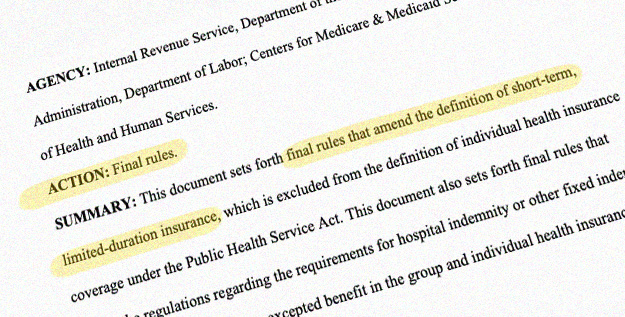In this edition
- Idaho is final state to open COVID-related enrollment window
- Bills under consideration in California, Maryland would connect unemployment applicants with health coverage
- DOJ asks Supreme Court to cancel hearing in Medicaid work requirement case
- Virginia lawmakers head to conference committee over reinsurance funding
- Iowa, Kentucky Houses approve bills limiting insulin cost-sharing; other states consider similar bills
- South Dakota becomes fifth state to allow non-insurance Farm Bureau health plans
- Oscar Health to become publicly traded company, with 31 million shares for sale next week
- Senate committee hearings focus on HHS Secretary nominee Xavier Becerra
Idaho is final state to open COVID-related enrollment window
Before we delve into this week’s news, a reminder that enrollment is now open for 2021 individual/family health insurance in every state except Idaho – but Idaho’s enrollment period will start on Monday. Uninsured people have another opportunity to sign up for coverage, and in most states, people who already have coverage can use this window as an opportunity to switch to a different plan if it would better meet their needs.
The Biden administration and the states that run their own exchanges are also pouring a great deal of money into marketing and outreach during this period, in an effort to reach the millions of uninsured Americans who don’t yet know about the coverage and financial assistance available to them via the marketplace or Medicaid. In most states, the enrollment window continues through May 15, but there are several states with different deadlines.
Bills under consideration in Maryland, California would connect unemployment applicants with health coverage
California S.B. 644, introduced last week, would help to connect unemployed California residents with health coverage resources, starting in July 2022. Under the terms of the legislation, the California Employment Development Department (EDD) would provide Covered California (the state-run exchange) with contact information for people who apply for programs administered by the EDD, including unemployment benefits, state disability, paid family leave, etc. Covered California would then reach out to these individuals, determine whether they’re eligible for Medi-Cal or premium subsidies, and help them get enrolled in coverage if they choose to do so.
In Maryland, a similar bill (H.B. 1002) would allow people seeking unemployment benefits to consent to having their contact information and other relevant information shared with Maryland Health Connection (the state-run exchange) and the Maryland Department of Health. These agencies could then determine whether the resident would be eligible for financial assistance with their health insurance, and help them enroll in coverage. Maryland already has an “easy enrollment” program that connects residents with the health insurance exchange via their tax returns; H.B.1002 would expand the outreach to include people dealing with the loss of a job.
DOJ asks Supreme Court to cancel hearing in Medicaid work requirement case
On Monday, the Department of Justice asked the Supreme Court to scrap the oral arguments that are scheduled to be heard next month in a case to determine the legality of Medicaid work requirements. The case focuses on the work requirements in Arkansas and New Hampshire, but it would have ramifications for work requirements that the Trump administration approved in several other states as well.
Work requirements are not currently in effect in any state, and would not be compatible with the current rules that allow states to receive additional COVID-related federal Medicaid funding, on the condition that enrollees’ coverage not be terminated during the pandemic emergency period. But some states, including Arkansas, hope to eventually reimpose a Medicaid work requirement.
The Biden administration notified states earlier this month that the Medicaid work requirements that were approved over the last few years are now being reconsidered. Arkansas, which had the previous administration’s support in the work requirement lawsuit, filed a brief asking the Supreme Court to ignore the Department of Justice’s request and continue with the scheduled oral arguments next month. But Arkansas officials have also said that they will not seek reapproval for the work requirement when the current waiver expires at the end of this year, and are instead considering a work incentive program that would provide private coverage to people who participate in the program, and traditional Medicaid to those who don’t.
Virginia lawmakers head to conference committee over reinsurance funding
Virginia lawmakers have been working on a bill to create a reinsurance program in the state. But as has been the case in some other states that have considered reinsurance programs, there’s disagreement over how to cover the state’s portion of the funding.
The measure passed by Virginia’s House of Delegates earlier this month called for an assessment on individual/family and large group health plans in the state (but not small-group plans), set at 1% of the prior year’s premium revenue. But the Senate has proposed funding the state’s share of the reinsurance program – estimated at $40 to $60 million – from general fund revenues, without the need for an assessment on health insurers.
The two chambers are taking the measure into a conference committee, and have until March 1 to come to an agreement. Assuming they do reach an agreement, the reinsurance program is slated to take effect in 2023 – but it’s possible that the conference committee could work out an arrangement that allows it to take effect in 2022 instead. (Most other states that have established reinsurance programs have had them up and running by the plan year immediately following the enactment of legislation to start the program.)
Iowa, Kentucky Houses approve bills limiting insulin cost-sharing; other states consider similar bills
Yesterday, Kentucky’s House of Representatives voted unanimously to pass H.B. 95, which would require state-regulated health plans to cap cost-sharing for insulin at $30/month, starting in 2022. The measure now heads to Kentucky’s Senate for further consideration. A similar bill – but with a cost-sharing limit of $100/month – passed in Iowa’s House of Representatives earlier this month.
A bill that would cap insulin cost-sharing at $50/month was introduced in California’s Senate last week. And although Illinois was one of the states that enacted legislation last year to cap insulin cost-sharing at $100/month, a new bill was introduced in the Illinois House last week that would lower that cap to $30/month. West Virginia also enacted a $100/month cap last year, but a new bill was introduced this month in West Virginia’s Senate that would lower the cap to $25/month.
In 2019, Colorado became the first state to enact legislation to limit cost-sharing for insulin. Several other states enacted similar legislation last year, and several more had already begun considering bills to limit cost-sharing for insulin earlier this year.
South Dakota becomes fifth state to allow non-insurance Farm Bureau health plans
South Dakota Gov. Kristi Noem signed a bill last week that will allow the South Dakota Farm Bureau to offer health plans that will not be considered health insurance, and that will be specifically exempt from state and federal insurance laws and regulations. Tennessee, Kansas, Iowa, and Indiana already allow this type of plan to be sold.
South Dakota Farm Bureau noted that its plans to partner with a third-party administrator to offer the new plans. SDFB does intend to cover the Affordable Care Act’s essential health benefits, but it’s expected that that plan will use medical underwriting as a mechanism to keep costs down.
Oscar Health to become publicly traded company, with 31 million shares for sale next week
Oscar Health has filed to become a publicly traded company, with stock sales expected to begin next week. Oscar plans to offer 31 million shares, priced at $32 – $34 per share, potentially raising a billion dollars in the initial public offering. Shares will trade on the NY Stock Exchange under the ticker symbol OSCR.
Oscar offers health plans in 18 states this year. They have more than half a million members, most of whom are enrolled in individual/family plans obtained via the health insurance marketplaces. Although most insurers in the individual market struggled with losses in the early years of ACA implementation, many of them have since become profitable. But Oscar’s losses have continued to mount, despite steady expansion into new states and expansion into the Medicare Advantage market last year.
Senate committee hearings focus on HHS Secretary nominee Xavier Becerra
The Senate Health Committee held a hearing yesterday with California Attorney General Xavier Becerra, President Biden’s nominee to lead the Department of Health and Human Services. Another hearing takes place today, with the Senate Committee on Finance. The committees will then make a recommendation to the rest of the Senate, and the nomination will be sent to the full Senate for debate and a confirmation vote. If Becerra is confirmed, he would be the first Latino Secretary of Health and Human Services.
Becerra was previously in the U.S. House of Representatives from 1993 to 2017. He voted for the Affordable Care Act in 2009/10 and then voted to protect it numerous times over the ensuing years. Becerra became California’s Attorney General in 2017, taking over from Kamala Harris when she was elected to the Senate. He led numerous legal battles against the Trump administration, and some Senate Republicans have expressed opposition to his nomination.
Democrats and the White House have expressed confidence that Becerra will be confirmed. With the 50-50 split in the Senate, Becerra could be confirmed on a party-line vote, with Vice President Kamala Harris casting the tie-breaking vote. But moderate West Virginia Democrat Joe Manchin has indicated that he’s undecided on Becerra’s nomination. There are, however, moderate Republicans who may support Becerra’s confirmation.
Louise Norris is an individual health insurance broker who has been writing about health insurance and health reform since 2006. She has written dozens of opinions and educational pieces about the Affordable Care Act for healthinsurance.org.








